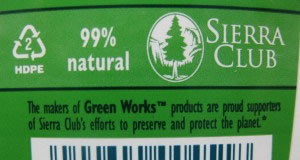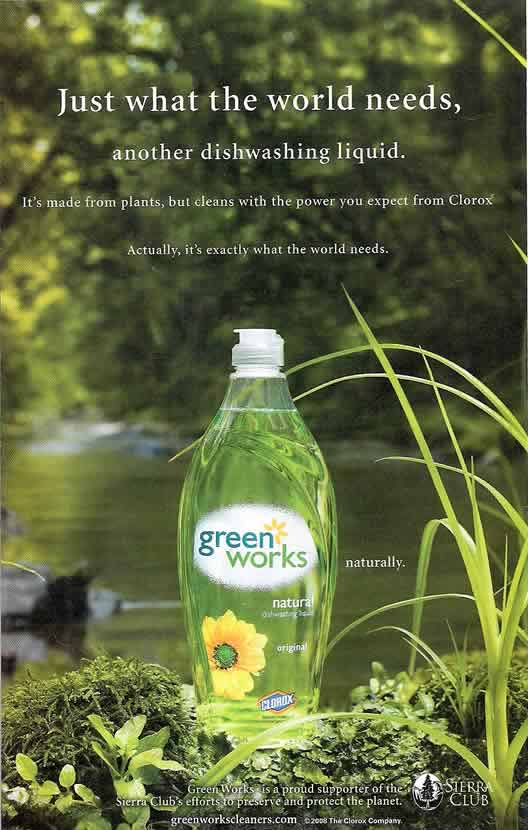In 2008 the chemical company Clorox, best known for its chlorine bleach, introduced a new line of household cleaning products, named GreenWorks, that would have the Sierra Club name and logo on their label. It was the first product endorsement that the 116 year old Sierra Club had ever made. It gave GreenWorks environmental credibility and helped its market penetration, achieving almost  50% of market share for 'natural' home cleaning products within two years.
50% of market share for 'natural' home cleaning products within two years.
In return Clorox gave the Sierra Club over a million dollars in the first two years, based on sales of the products. In addition, Sierra Club executive director Carl Pope argued that the partnership would give consumers a choice of more environmentally-friendly products that they could be confident would work.
Most of the chemicals in the new Clorox products come from plant sources, the company said, with virtually no petroleum-derived ingredients.
Mr. Pope said that “we made sure these chemicals were all something we could be comfortable with.”
Not all were. “There is ethanol in it, and the ethanol might be made with genetically engineered corn,” Mr. Pope added.
“But we thought, if that’s the worst thing that can be said about it,” it’s not so bad. “There aren’t products without any environmental consequences.”
Apart from ethanol, some GreenWorks products also contain synthetic dyes to improve appearances and sodium lauryl sulfate, which the Clorox describes as a "coconut-based cleaning agent" but which the American College of Toxicology describes as a known skin irritant.
Shortly after its launch the National Advertising Division (NAD) of the Council of Better Business Bureaus found that GreenWorks advertising claims that it worked as well as other clearners were misleading. "NAD determined that Green Works products ... do not perform as well when it comes to cleaning tough grease. Green Works products also do not kill germs."
Many Sierra Club members were horified by Sierra's endorsement of Clorox GreenWorks products. At the time the Clorox Company had revenues of almost $5 billion per year, employ ing 7,800 people in 25 countries and selling its products in over 100 countries. In 2004 it had been cited as "one of the nation's most chemically dangerous" companies. Clorox admitted:
ing 7,800 people in 25 countries and selling its products in over 100 countries. In 2004 it had been cited as "one of the nation's most chemically dangerous" companies. Clorox admitted:
The Company is currently involved in or has potential liability with respect to the remediation of past contamination in the operation of some of its currently and formerly owned and leased facilities... some of these facilities may have used substances or generated and disposed of wastes that are or may be considered hazardous... The Company handles and/or transports hazardous substances, including but not limited to chlorine...
Many environmentalists, including members of the Sierra Club, had been campaigning to phase out chlorine-based products because of the dangers involved (see dioxin case-study). Despite manufacturing and selling GreenWorks, Clorox would continue manufacturing and selling products with more toxic ingredients:
what message does this send to corporate America? No matter how much you pollute, if you stick one non-toxic product on the market some large, high profile environmental group may endorse you and enable you to engage in a greenwashing campaign... This activity is tantamount to the Club endorsing Philip Morris, because they came out with a safe brand of cigarette while continuing to poison people with all their other brands, or Chevron for drilling responsibly somewhere in the world.
However the leadership of the Sierra Club went ahead with the Clorox deal despite it being rejected by the Club's Corporate Relations Committee, and without consultation with rank and file members or even the Club's Toxics Committee.
When grass-roots members pointed out that Clorox was fined $95,000 for violating U.S. pesticide laws just as the deal with the Club was being brokered, staffer Johanna O'Kelley dismissed Clorox's culpability, saying their violation was "a technicality."
In fact Clorox had been found guilty of donating illegal pesticides to charity.
The most united internal opposition to the deal came from Sierra's Florida Chapter, the fourth largest in the country with 35,000 members. In response Sierra's national board of directors suspended the chapter for 4 years and fired the entire leadership of the Florida chapter, including 27 elected representatives, 75 volunteer appointees, and 24 Issue Committees replacing them with an "Executive Committee" of 5 National officers.
In 2013 Clorox decided to part company with the Sierra Club, removing its logo from its GreenWorks products. The products, which were sold with a 20 percent-plus premium to conventional cleaners, had faced declining sales and market share. Clorox sought to remove the premium and reposition them as “affordable, effective, accessible and approachable.” The repositioning was accompanied by a social media campaign worth a projected $10 million through mid-2014 that made fun of those who took efforts to be green too seriously (see YouTube below).
The membership of the Sierra Club declined from over a million before the agreement to 616,000 in 2011 when Carl Pope left the Sierra Club, amid discontent about the direction of the Club, "to devote most of his time to 'revitalizing the manufacturing sector' by working with organized labor and corporations".